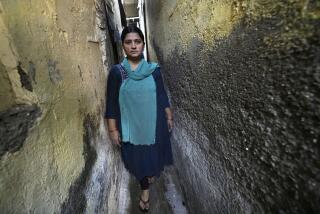India woman is an ‘untouchable,’ with a Midas touch
- Share via
NEW DELHI — She was called dirty, ugly, a “little packet of poison,” the offspring of donkeys. These days, Kalpana Saroj is called something else: a millionaire.
Saroj, a dalit, or “untouchable,” epitomizes what was once unthinkable in India: upward mobility for someone whose caste long meant she would die as she was born: uneducated, dirt-poor, doomed to a life of dangerous and filthy work.
The manufacturing tycoon — one admirer called her “a real slumdog millionaire” — is among a legion of dalits embracing new opportunities in business, politics, the arts and academia as prejudices ease and economic reforms open new doors in a culture that traditionally emphasized fate and reincarnation.
“Before, Indians thought the only way up was life after death, assuming they avoided hell,” said Chandra Bhan Prasad, a dalit researcher and activist. “Now, not having a mobile phone is hell. Dalits can’t become Brahmins, but they can become capitalists. Once you become rich, you become free.”
Others counter that a few Horatio Alger bootstrap stories can’t sugarcoat the continued suffering of the 17% of India’s 1.2 billion people facing discrimination under an ancient, complex system that traditionally determined one’s occupation and social status at birth, with Brahmins at the top and “unclean” dalits at the bottom shoveling human waste.
Saroj, 51, once hissed at by Brahmins, has built a business empire that employs thousands of upper-caste workers, she said. As she sipped tea in a luxury New Delhi mall, she was wearing gold bracelets, diamond earrings and a traditional salwar kameez worth thousands of dollars. (After her daughter settled on studying hotel management a few years ago, Saroj bought her a hotel. With her son now in possession of a pilot’s license, she’s shopping for a plane.)
Emerging from extreme poverty and pariah status to a position of strength and wealth has certainly been satisfying, she said. That fact that she is a woman — in a country ranked by the United Nations as among the world’s most dangerous places to be born a girl, given high female infanticide, inferior healthcare and nutrition — made her rise more extraordinary.
And although her ascent hasn’t been without its share of speed bumps or caste-related jibes, she said, she has tried to channel anger and frustration into getting things done.
“I’m aware people may still look down on me because I’m a dalit,” she said. “But even when I was very agitated, I never lost my cool, always trying instead to find my way out of difficult situations.”
Saroj was born in Repatkhedha, a tiny village in the western state of Maharashtra, the eldest daughter of a homemaker and a policeman. Dalits were barred from drinking from Brahmin wells, and school for Saroj was an eight-mile walk on dirt paths, interrupted by occasional beatings by upper-caste children.
When she was 8, she asked her mother why, and was told to accept her fate.
“This was my world,” she said. “I didn’t really think about it.”
She was married off at 12 to a laborer from Mumbai at the insistence of an uncle who considered girls “little packets of poison.”
“Your daughter’s an ugly, dark-skinned kid,” he told her father. “If someone from Mumbai is willing, you’d darned well better marry her off.”
Her husband, his alcoholic brother and wife all beat her. Sometimes her brother-in-law would yell: Whom did her mom sleep with to produce this donkey?
“All my dreams were shattered,” she said. “It was hell.”
After six months, her father rescued her. But the village ostracized her and she ended up drinking rat poison and fell into a coma, barely surviving. Afterward, villagers concluded that she must have a guilty conscience.
“I realized, whether I live or die, I’ll get blamed,” she said. “So I might as well go for it.”
Saroj lobbied to return to Mumbai, threatening to try suicide again when her family balked. Once there, she got a job removing lint from finished garments at a hosiery company for 15 cents a day. During lunch breaks she practiced on the sewing machines and became a tailor for $5 a day.
“It was the first happiness in 15 years,” she said. “I’ve earned millions. But that initial $5 was the most satisfying.”
When Saroj was in her early 20s, her sister became ill and died because they couldn’t afford a hospital. “I realized, if it’s all about money, I need to control it,” she said.
She borrowed $1,000 under a lower-caste government program, opening a furniture and blouse-making business that prospered. She learned about some property ensnared in liens and acquired it for $5,000 in savings and an IOU for a fraction of its worth. Eventually she secured the necessary clearances and found a partner to build a shopping complex.
“She is a struggler,” said Madhusudan Anand Batkar, 38, a social worker from Keriveri, a village near Saroj’s hometown, “a real slumdog millionaire.”
Her reputation as a fixer led to another disputed property. When goons threatened her, she stared them down. “I wasn’t afraid,” she said. “I’d already faced death.”
That too did well, leading to a stake in a sugar company and then to industrial equipment maker Kamani Tubes. The troubled firm was saddled with a $24-million debt and 140 court cases after its workers took over the factory for unpaid wages. The union asked her to run it and within a few years, she’d also turned that around.
These days, Saroj acknowledges being a bit of a workaholic. She starts her day with yoga, often works 12-to-14-hour days and spends several more hours commuting. In her meager free time, she likes listening to music and cooking. Her other passion is gardening at her rambling terrace apartment, which she designed to her taste because she owns the building.
Periodically, Saroj returns to her village to distribute food and clothing, set up schools, offer jobs to abused women. “She’s very confident,” said Chaggan Khandare, 36, a dalit social worker in the district. “She tells us to fight for what you want, never give up.”
Although clearly extraordinary, she’s not alone in her success. The Dalit Indian Chamber of Commerce and Industry now has several dozen millionaires among its 1,000 members.
“We want dalit capitalism,” said millionaire contractor Milind Kamble, the chamber’s founder and chairman. “We’ve been very inspired by black capitalism in the U.S.”
But even as millions of lower-caste Indians climb into the middle class with the help of affirmative action policies, progress for the vast majority of dalits is incremental, at best.
“There are success stories,” said Damodar Manohar, a 68-year-old villager in Repatkhedha. “But the overall situation hasn’t changed much.”
There are still thousands of attacks on dalits annually and hundreds die. A dalit was stabbed to death recently for hitting a bull, considered holy by Hindus; a dalit was beaten to death for filing a lawsuit against an upper-caste member; and a dalit widow was beaten and reportedly paraded naked after her son eloped with his upper-caste girlfriend.
Dalits, caste activist Kancha Ilaiah says, should take a cue from the social upheaval that helped African Americans battle racism.
“A sprinkling of millionaires, some top politicians won’t change people’s thinking,” he said. “We need a civil war.”
But for Saroj, owner of “five or six” cars, including a $200,000 Mercedes S-Class, it’s been quite a ride.
“I was treated as something lower than a person,” she said. “But I’ll die a human being.”
Tanvi Sharma of The Times’ New Delhi bureau contributed to this report.
More to Read
Sign up for Essential California
The most important California stories and recommendations in your inbox every morning.
You may occasionally receive promotional content from the Los Angeles Times.










